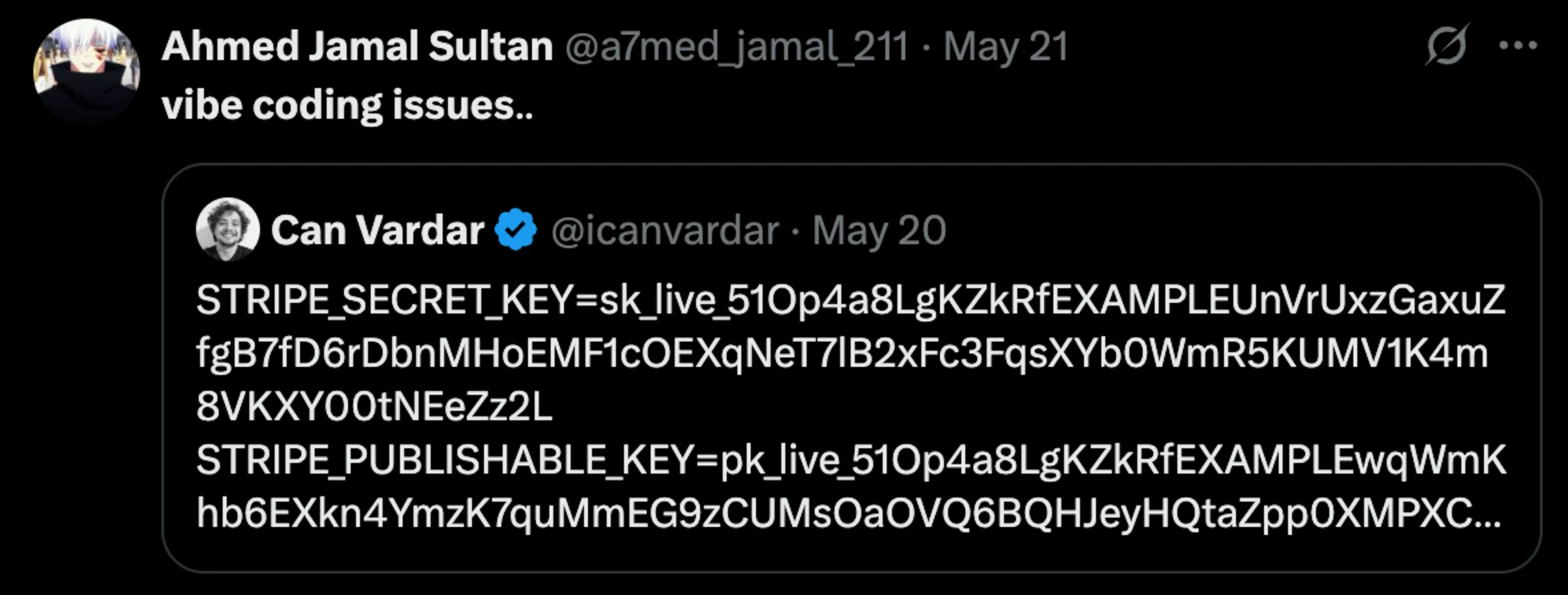

Wahyu Ivan
Frontend Engineer
5 min read
June 2, 2025
Vibe Coding: The dangers of "good enough" code & how to build quality software
We've all seen it, maybe even done it. That rush to push features, to get something working, is often fueled by caffeine and the sheer pressure to deliver. It's what some are calling "vibe coding". We're not just talking about quick fixes, but building software, sometimes heavily relying on AI code generation, based on gut feeling, quick hacks, and a notorious "we'll fix it later" mentality.
X (formerly Twitter) feeds often give us a peek into vibe coding in action: sometimes it looks like a brick wall built with more passion than precision.

And, sometimes, it looks like someone is just casually broadcasting your deepest secrets to the world.

The digital equivalent is "hold my beer and watch this." It might seem like it's working at first glance. But just like that wavy wall, the structural integrity of this code quality is questionable at best. And with AI tools now capable of generating vast amounts of code in seconds, we risk building these shaky foundations faster and on a grander scale than ever before, leading to significant technical debt.
What’s going on with "vibe coding" and “AI replacing umans”?
The tech world is buzzing with "vibe coding" (building fast, often messy) and the fear or promise of AI replacing jobs.Sometimes, these collide. Look at Klarna:

Klarna boasted AI could do it all. They replaced 700 workers with AI agents, then reportedly wanted humans back after a $40B fall. This is a huge red flag: showing how the rush for AI efficiency, potentially fueling a “vibe code” approach, can backfire spectacularly.
"Vibe coding" thrives on pressure, enthusiasm, and sometimes, over-reliance on AI without deep understanding. While AI can code, it can't replace human oversight, quality control, or fixing the complex messes that "good vibes" and unchecked automation can create. We still need people for secure software development and maintaining code quality.
The perils of "vibe coding": security, code quality, and AI
While a wavy brick wall might just be an eyesore, "vibe code" can have catastrophic consequences for your software solutions:
- Security Nightmares: This is the most immediate danger. Rushing often means hardcoding secrets, ignoring input validation (opening doors for SQL injection or XSS), using outdated libraries with known vulnerabilities, and skipping security reviews.The cost isn't just financial but also a breach of trust, reputational damage, and legal trouble.This undermines all efforts in secure software development.
- Code Quality Catastrophe: Vibe code is the birthplace of technical debt.It’s hard to read, harder to maintain, and almost impossible to scale. New features become a nightmare to implement, bug fixes introduce more bugs, and onboarding new developers takes ages.It's like building on quicksand, and that wavy wall will eventually crumble, impacting your overall software development best practices.
- The AI Double-Edged Sword: AI can be a fantastic productivity booster. But when used as a "vibe coding amplifier," it's dangerous. AI code generation might:
- Look plausible but is flawed: It might solve the immediate problem, but it introduces subtle security holes or performance bottlenecks.Lack context: AI doesn't understand your entire system's architecture or long-term goals.Reduce understanding: Relying too heavily on AI without reviewing and understanding its output means developers lose touch with their own codebase, hindering true code quality improvement.
Building beyond the vibe: The pillars of quality software
So, how do you escape the "vibe code" trap or, better yet, avoid it altogether? Think about 'building smart', not 'slowing to a crawl'. Here’s what’s essential for scalable software solutions:
- Solid Architecture & Design: Before a single line of code is written, understand the requirements, plan the architecture, and consider scalability and future needs. This is fundamental for software architecture best practices.
- Coding Standards & Best Practices: Enforce consistent coding styles, follow established design patterns, and prioritize clean, readable code.This directly contributes to high code quality.
- Security by Design (DevSecOps): Integrate security practices into every stage of the development lifecycle. This includes secure coding training, vulnerability scanning, penetration testing, and proper secret management.No more API keys in public code! This is core to secure software development.
- Rigorous Testing: Implement a comprehensive testing strategy – unit tests, integration tests, end-to-end tests, and security tests. "It works on my machine" is not a release strategy.
- Meaningful Code Reviews: Foster a culture where code reviews are seen not as criticism but as a collaborative effort to improve quality, catch errors, and share knowledge. These are vital for maintaining code quality.
- Clear Documentation: If someone new can't understand your code or system without a week-long handover, you have a problem. Document your architecture, APIs, and complex logic.
Incentro Asia Pacific: Turning your "vibe code" into a masterpiece
Feeling a bit uneasy, looking at your own codebase and seeing hints of that wavy wall? It happens. The good news is, it's fixable. At Incentro Asia Pacific, we specialize in transforming "vibe code" into robust, secure, and scalable software solutions that deliver real, long-term value.
We understand the pressures of the modern tech landscape, but we also know that cutting corners ultimately costs more. We help businesses by:
- Conducting Code Audits: We dive deep into your existing codebase to identify vulnerabilities, technical debt, and architectural weaknesses.
- Strategic Refactoring: We help you systematically improve your code's structure and quality without halting development.
- Implementing Best Practices: We introduce and help enforce industry-standard software development best practices, including CI/CD pipelines, automated testing, and DevSecOps.
- Building Secure & Scalable Solutions: Whether starting fresh or overhauling an existing system, we build products designed for growth and resilience, focusing on secure software development from the ground up.
Conclusion
Don't let "vibe coding" lead to a $40B fall. While the rush can be intoxicating, true success lies in building software that is as reliable and secure as it is innovative. AI is a powerful tool, but it requires skilled artisans to wield it effectively, not some ‘vibers’. Prioritizing code quality and a strategic approach ensures your digital foundation is rock-solid.
Ready to build software that stands strong and avoids the pitfalls of technical debt? Let Incentro Asia Pacific help you lay a solid foundation for the future.

3 min read
Why Neovim makes me a better developer

1 min read
Accelerating omnichannel commerce in Indonesia with Mekari Desty and Incentro

3 min read
Beyond Mastery: How Incentro fueled my associate Cloud Engineer journey

3 min read
Bioinformatics: A hidden world where code meets life
